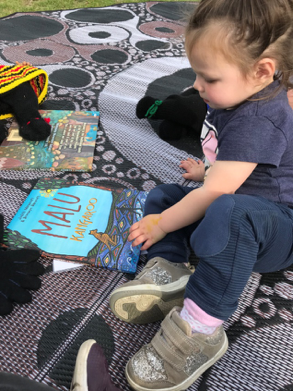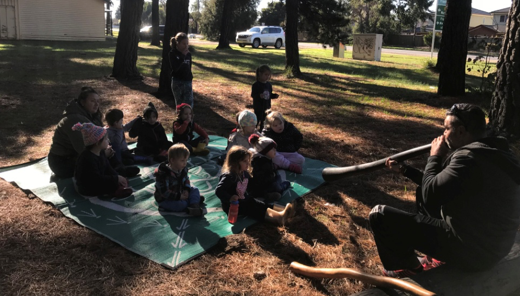We recently shared on Amplify the expertise of learning specialist Kerrie Maguire in developing an early childhood education service Reconciliation Action Plan (RAP). When we shared the story on the CELA Facebook page, your responses confirmed that creating a RAP is a high priority and linked to your Quality Improvement Plan (QIP) goals.
There’s nothing educators like more than learning from colleagues’ experiences and we’ve been very fortunate to find Lavinia Jenkin-Panelli, director, and Marieke Lutterberg: educational leader, from Tyabb Village Children’s Centre, willing to share every aspect of their RAP journey.
In fact, Lavinia and Marieke are preparing a book about the journey to share at their community-centred service and they have combined elements from their writing with additional responses to our questions for Amplify.
Their generosity means we can bring you their journey as a four-part series. If you miss one, don’t worry, just click on the ‘RAP journey series’ tag in any article to find the rest, and we will include back-links at the end of each article as we release new sections across the four weeks.
And now, let’s join Lavinia and Marieke on the story of the Tyabb Village reconciliation journey.
(We begin with an excerpt from the book)
Our journey began here
Tyabb Village Children’s Centre was established in 2015. In our first year we really focused on building the Village. We had to get to get to know the existing families and educators and merge them with new educators and new families. It was all about building a sense of Belonging for everyone who was part of the Village.
The second year of the Village became more about Being. We found our groove and were able to confidently build our curriculum around the current children’s and families’ needs and interests.
It was also a good time for our educators to start extending themselves with Professional Development opportunities and we slowly started questioning where we would like the Village to be in the future.
…we were missing the confidence, knowledge and understanding to put more Aboriginal and Torres Strait Islander content into our curriculum.
Closing the gap in our confidence
 Image credit: Reading resources, Tyabb Village Children’s Centre
Image credit: Reading resources, Tyabb Village Children’s Centre
One of the personal development sessions we attended was a Start Them Early conference, which was a national initiative as part of ‘Close the Gap’ for Aboriginal and Torres Strait Islander families and children.
Annette Sax (Yarn Strong Sista) was one of the key speakers and she mentioned the research by Sue Lopez Atkinson and her research into what Aboriginal families want for their children.
Over the year we bought many books and resources to bring more culturally appropriate materials into the Village, but through lots of reflection we found that we were missing the confidence, knowledge and understanding to put more Aboriginal and Torres Strait Islander content into our curriculum.
It’s a journey, not a goal to be ticked off…One of our first key learning moments!
Connections
We connected with Willum Warrain, our local Aboriginal Community Meeting Place and started taking the Aboriginal and Torres Strait Islander children who attended the Village to their Koori Kids Bush Playgroup.
We also made a connection with Deb Mellet, who is the Aboriginal Children and Families worker for the Mornington Peninsula Shire. She was very encouraging and organized a tour for us with Peter Koop, principal at Peninsula Specialist School, as they have embedded Aboriginal studies as an integrated part of their curriculum.
The visit to the school was interesting and encouraging! It was very clear that this journey could only work through a connection within the Aboriginal Community and with lots of time and patience. It’s a journey, not a goal to be ticked off…One of our first key learning moments!
We continued attending Bush Playgroup about once a month and we connected with Carla Lauch and learned about a company called Living Culture, run by her uncle, Lionel Lauch.
 Image credit: Bush playgroup, Tyabb Village Children’s Centre
Image credit: Bush playgroup, Tyabb Village Children’s Centre
Making it real
We planned a Professional Development evening for all our staff, as we quickly realized we needed to focus our learning and skill development in this area.
In the meantime we also wrote our meeting song, so every day we started with an acknowledgement of country with the children. Now we even incorporated key sign into it and the children all sing it regularly at the Village!
In 2018 the Village was able to allocate project hours each week, which opened the doors for a year of Becoming. We were ready to move beyond our own doors and go beyond what we currently provide.
The Reconciliation Action Plan
We officially commenced our Reconciliation Action Plan. A key goal is to embed an Aboriginal curriculum into the Village.
We don’t want to just celebrate NAIDOC week or participate in Reconciliation Week.
More reading: The path to reconciliation starts at our feet
The Village feels it has a role to play in building a pathway for Reconciliation from the start of children’s education. Therefore, we must have a good understanding of Aboriginal and Torres Strait Islander culture, history, and contemporary issues.
We are committed to teaching our children through respect, relationships and opportunities at the Village and in the wider community.
Skills, knowledge and a confidence to talk about history, culture and contemporary topics with children and adults in a respectful way which demonstrates a clear understanding.
Funding opportunity and goals
Early in 2018 our trusted inclusion support person Julie Dare invited us to apply for an Innovative Solutions Grant which was available through KU Children’s Services.
The grant was available to assist services to fund innovative and flexible solutions to inclusion. We connected with Carla and Lionel from Living Culture and were successful in our application to fund seven educational sessions with Lionel for our children, their families and for the educators.
The goal was to build the capacity of our educators through increasing their knowledge and understanding of our local Aboriginal culture.
Skills and knowledge which they can use in everyday interactions with the children.
Skills, knowledge and a confidence to talk about history, culture and contemporary topics with children and adults in a respectful way which demonstrates a clear understanding.
This is our story.
Next week: Tyabb Village’s story continues with the why and how of starting their RAP.
The Early Years Learning Framework (EYLF) was developed by the Australian and state and territory governments with input from the early childhood sector and early childhood academics.
Curriculum documents, such as the EYLF, are essential to the effective education of children in early learning services. An important aspect of the EYLF is teaching about diversity, specifically Aboriginal and Torres Strait Islander ways of knowing and being, and appreciating how these teaching practices impact the hearts, minds and actions of early learners.
Educators’ teaching and learning about Aboriginal and Torres Strait Islander ways of knowing and being is supported by the principles and practices of the EYLF, and will contribute to supporting the Framework’s five intended learning outcomes. These principles, practices and desired learning outcomes guide teachers and educators in their professional practice and ensure a minimum standard of quality is achieved across early learning environments.
Source: Narragunnawalli
Related articles